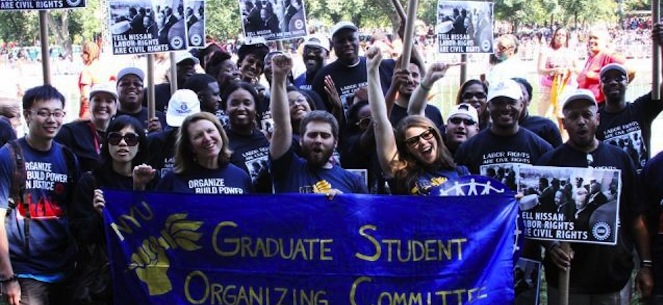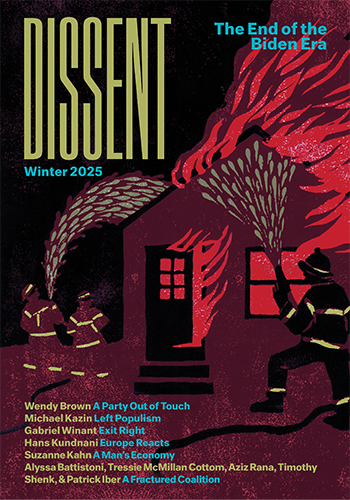NYU Victory: A Catalyst for University Organizing?
NYU Victory: A Catalyst for University Organizing?

Earlier this week, members of the GSOC (Graduate Student Organizing Committee) -UAW bargaining unit at New York University voted overwhelmingly (620 to 10) for union recognition. The result means that GSOC is (once again) the first graduate-employee union at a private university. The union previously won a contract in 2001, but the NYU administration refused to bargain a new one in 2005, precipitating a long and bitter strike that enveloped the entire campus and attracted high-profile attention from significant sectors of the labor movement. In the years since then, the union has pursued a legal remedy through the National Labor Relations Board, with the goal of overturning the Bush-era board’s 2004 decision against according graduate teachers the status of employees. For its part, the administration continued to throw money at union-busting law firms in hopes of staving off GSOC.
Why did both sides come to the bargaining table now? Over the course of this last year, President John Sexton has been rebuffed by eight votes of no confidence from NYU’s various constituent schools. His administration was further battered by public outrage following revelations about inflated compensation packages and forgivable loans (often for summer homes) handed out to senior officers of the university. To make matters worse, faculty activists lodged a lawsuit against NYU’s $5 billion expansion plan, and the administration’s network of overseas campuses came under intense scrutiny. Besieged on all sides, it’s fair to conclude that the last thing that Sexton and his senior associates needed was another high-profile fight with the graduate union. The decision to recognize the union, after almost fifteen years of costly opposition, came at a time when the employer was severely weakened.
Even so, the administration’s strenuous efforts to have NLRB member Nancy Schiffer recused from the GSOC case (because of her prior association with the UAW) played a role in pushing the union toward its decision to bargain outside of the framework of labor law. To those, both inside and outside the union, who have been following the painfully slow progress of the petition, the recusal might have been the last straw. Concluding that an NLRB decision was not likely any time soon, the union will now withdraw its petition as a condition of the agreement with NYU. What are the implications of that act?
First and foremost, it means that would-be unions at other private universities should be encouraged to file their own petitions with the NLRB. The legal process must continue, if the board’s wrongheaded 2004 decision is to be reversed. But the NYU agreement has set a new precedent. A private university has recognized a grad union outside of the parameters of national labor law. If NYU can do it, why not others? No doubt, many student organizers, not to mention university administrators, will be asking this very question.
Likewise, the agreement opens the way, potentially, to faculty organizing in the private sector. After all, there is nothing to stop a private university from bargaining with its faculty outside of the narrow confines of the 1980 Yeshiva decision, which determined that full-time faculty were managerial employees and could not therefore unionize. Several pre-Yeshiva unions continue to thrive. Full-time contract faculty, the fastest growing segment of the academic workforce, might well be next in the queue.
Last but not least, waiting for the ever-thwarted NLRB to do its work meant that organizing has stalled for several years at many private universities. The NYU agreement should jumpstart the momentum elsewhere, putting the private sector of the academic labor movement back in business.
On the eve of the 2005 strike, I was among a group of faculty that met with John Sexton to urge him not to go down the union-busting path. Breaking a union, we warned him, is like breaking someone’s arm. They will not rest easy unless they regain its full use. As of last night, GSOC’s arm is officially back in action.
Correction: an earlier version of this post stated that “President John Sexton has been rebuffed by seven votes of no confidence”. He has been rebuffed by eight. We regret the error.
Andrew Ross teaches at NYU, where he is president of the AAUP chapter. His new book is Creditocracy and the Case for Debt Refusal.




